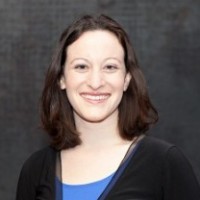
Elissa Frankle
In 2013, Ms. Frankle gave her first Digital Dialogue, “Making History with the Masses: Citizen History and Radical Trust in Museums.” Three years later, the United States Holocaust Memorial Museum has taken the theory of citizen history into practice with the launch of a full-scale citizen history project, History Unfolded: US Newspapers and the Holocaust. During that time, the Museum undertook a learning journey to test assumptions about community engagement, crowdsourcing, and digital development. “Making History with the Masses Revisited” reviews the theory and practice of citizen history as updated for 2016, and outlines a path forward for citizen history as a methodology in public history.
Citizen history is, as ever, a contract and a dialogue, where the participant is more than a user or contributor and is instead elevated to a full partner in the process of discovery. This time, though, the process of learning from participants begins before they even open the project site. By listening to and learning from communities from the first steps of a citizen history project, institutions can better serve not only the needs of the project or their participants, but the larger body of historical inquiry and their institutions’ larger goals of engagement and relevance. This talk will also touch on the nuts and bolts of creating a citizen history project: who needs to be in the room where it happens? What does success look like? And how do you ensure the waltz of marketing, digital development, historical inquiry, and participant engagement is in time from the first beat to the last chord?
See below for a Storify recap of this Digital Dialogue, including links to resources and projects that Frankle referenced during her talk.
Elissa Frankle is the Digital Projects Coordinator for Digital Learning and New Media at the United States Holocaust Memorial Museum, where she manages the in-museum digital experience and advocates for the inclusion of visitor voices in the work of the Museum. A longtime cheerleader for citizen history, Elissa served as the community manager for the Holocaust Museum’s first citizen history project, Children of the Lodz Ghetto: A Memorial Research Project, and is the current project lead for History Unfolded: US Newspapers and the Holocaust, a major citizen history undertaking in support of the Museum’s upcoming initiative on Americans and the Holocaust. Outside of work, Elissa serves as the Leadership Development and Awards chair for the American Alliance of Museums’ Education Professional Network (EdCom), and organizes the DC chapter of Museum Workers Speak, where she fights for paid internships and greater equity in museum labor practices throughout the field.
A continuously updated schedule of talks is also available on the Digital Dialogues webpage.
Unable to attend the events in person? Archived podcasts can be found on the MITH website, and you can follow our Digital Dialogues Twitter account @digdialog as well as the Twitter hashtag #mithdd to keep up with live tweets from our sessions. Viewers can watch the live stream as well.
All talks free and open to the public. Attendees are welcome to bring their own lunches.
Contact: MITH (mith.umd.edu, mith@umd.edu, 301.405.8927).
